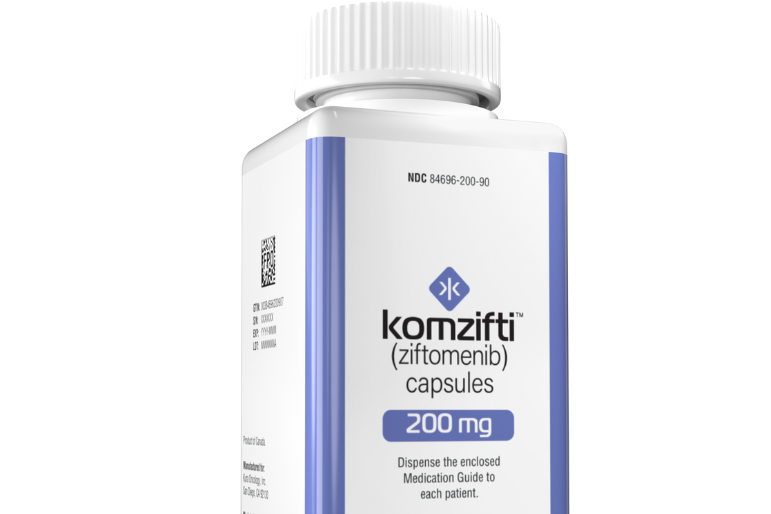
The FDA has approved a Kura Oncology drug developed for cases of acute myeloid leukemia (AML) carrying a certain genetic signature, giving the biotech its first commercial asset and the opportunity to challenge a Syndax Pharmaceuticals product that was first to the market in this class of targeted cancer therapies.
This emerging drug class treats leukemias characterized by a mutation to the NPM1 gene. The Thursday regulatory decision for Kura’s drug, ziftomenib, covers the treatment of adults whose relapsed or refractory AML carries this signature and has no treatment alternatives. San Diego-based Kura, which is partnered with Kyowa Kirin, will commercialize its new once-daily pill under the brand name Komzifti.
AML is a cancer of myeloid cells, white blood cells that typically develop into normal blood cells in the bone marrow. The NPM1 mutation occurs in an estimated 30% of AML cases. NPM1 is a gene that codes for a protein involved in several cellular processes. Mutations to this gene lead to abnormal protein that contributes to the uncontrolled growth of immature white blood cells.
Komzifti does not act directly on NPM1 or its protein. The progression of acute leukemias can be driven by the interaction of NPM1 with a protein complex comprised of menin and KMT2A. Kura’s oral small molecule is designed to inhibit menin, blocking that protein’s interaction with KMT2A.
The FDA decision for Komzifti is a full regulatory approval. The drug’s submission was based on data from an open-label, single-arm Phase 2 study that enrolled 112 adults. The main goal was measuring the rate of complete remission plus complete remission with partial hematological recovery. Results showed this rate was 21.4%; the median duration of this response was five months. Furthermore, 88% of patients who achieved complete remission or complete remission with partial hematological recovery did so within six months of starting treatment with the Kura drug. These results were published in September in the Journal of Clinical Oncology.
The approval of Komzifti comes nearly a year after Revuforj, from Syndax, became the first FDA-approved menin inhibitor. The regulatory decision covered the treatment of acute leukemias in adults and children age 1 and older whose disease is characterized by an alteration to the KMT2A gene. Last month, the FDA approved expansion of that drug’s label to include the treatment of AML in adults and children age 1 and older whose cancer carries the NPM1 mutation.
Kura aims to differentiate from Syndax’s Revuforj with claims of patient convenience and better safety. Komzifti is taken once-daily compared to the twice-daily oral dosing of Revuforj. On safety, both products have black box warnings for the risk of differentiation syndrome, a complication that develops when a cancer drug triggers an excessive immune response from the leukemia cells. While differentiation syndrome can become fatal, it is manageable with corticosteroids and monitoring. But Revuforj’s black box warning also includes the risk of QTc prolongation, which is an irregular heart rhythm, as well as Torsades de Pointes, which is an abnormally fast heart rhythm.
The same heart complications are included in the Komzifti label, but in the warnings and precautions section, not the black box warning, Kura CEO Troy Wilson said during a Thursday conference call. Dr. Eunice Wang, chief of the leukemia service and professor of oncology at Roswell Park Comprehensive Cancer Center and principal investigator in Komzifti’s clinical trial, said treatment-related adverse events were infrequent and manageable. She also noted that the Komzifti label does not include warnings for drug-drug interactions. That’s important because many leukemia patients also take additional medications, such as drugs that inhibit the liver enzyme CY3PA4, which affects the exposure of a cancer drug in the body.
“This absence of drug-drug interactions, and the fact that ziftomenin is not associated with a boxed warning for QTc prolongation and Torsades de Pointes, represents a significant clinical benefit for our patients,” Wang said. “These patients are frequently on a number of medications, which can interact with CY3PA4 and/or prolong the QT interval. As a practicing clinician, if one could choose a menin inhibitor without a drug-drug interaction or a boxed warning, one would prioritize the menin inhibitor with the better benefit-risk profile.”
Komzifti carries $48,500 price for a one-month supply. Chief Commercial Officer Brian Powl said the company expects the drug will become available in the next few business days. Kura projects this product could generate $350 million to $400 million in annual sales in the relapsed and refractory NPM1 mutation AML market. But Powl noted that the company is testing the drug as an earlier line of treatment and in combination with other AML therapies. Data from these studies are set for presentation next month during the annual meeting of the American Society of Hematology. In the front-line setting, Kura projects Komzifti could achieve $7 billion in sales.
Kura will commercialize Komzifti through a partnership with Kyowa Kirin that began last year. Under the agreement, Kura leads U.S. commercialization and is responsible for manufacturing the product. Kyowa Kirin will lead development and commercialization of the drug outside the U.S.
Photo by Kura Oncology










